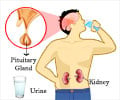In type-2 diabetes insulin is held up in traffic. Glucose-dependent granule docking limits insulin secretion and is decreased in human type-2 diabetes.

‘This cutting-edge research finds that the secretion of insulin into the body is obstructed in type-2 diabetes. The obstruction occurs within a mechanism where glucose regulates the secretion of insulin. This mechanism is absent in type-2 diabetes.’





Type 2 diabetes is a major public health issue with globally more than 400 million individuals affected. Both lifestyle and hereditary components contribute to the disease.A team led by Sebastian Barg at Uppsala University has now discovered that this is due to a defect that slows down the traffic of insulin packages out of the beta-cell. Insulin is released when small insulin-containing vesicles fuse with the cell membrane, which ejects the hormone into the bloodstream. For this to happen, each of the vesicles must first attach to the cell membrane and allow its secretion machinery to be assembled.
By comparing beta-cells from healthy and type 2 diabetic individuals, the researchers found that the problem lies in the attachment of the insulin vesicles to the cell membrane.
In diabetic beta-cells, arrival of new vesicles at the cell membrane is dramatically slowed, which is likely due to a reduction in several of the proteins responsible for their attachment at the cell membrane. As a consequence, new insulin vesicles cannot assemble their secretion machinery and the amount of insulin that reaches the body is insufficient.
The hope is now that the report can guide the development of new treatments for type-2 diabetes.
Advertisement















